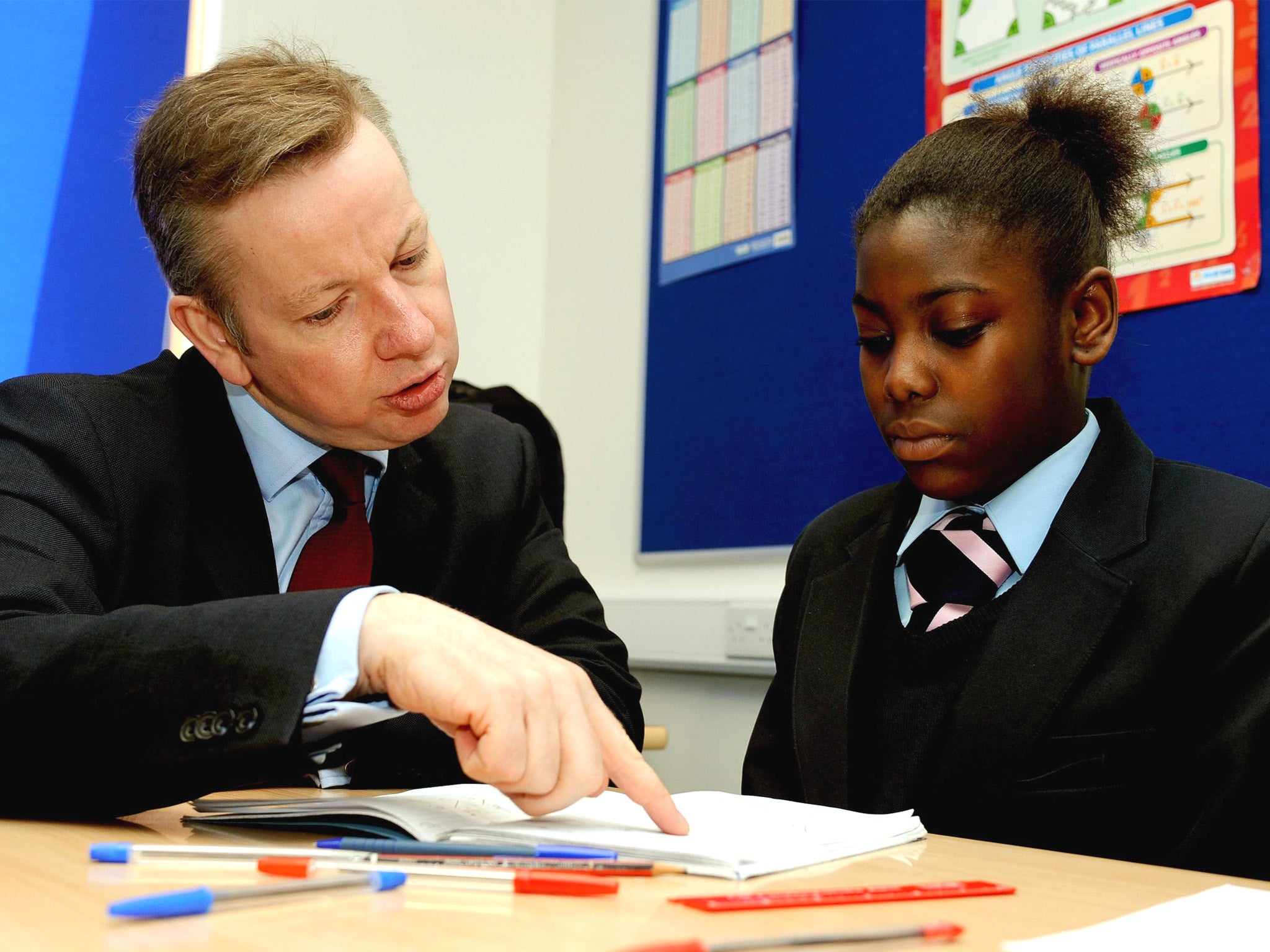Tory grandee attacks Gove's 'huge mistake' on new exams
Former Education Secretary Lord Baker says plans for EBacc will not outlive the Government

Children should transfer schools at the age of 14 rather than 11, a former Education Secretary, Kenneth Baker, has proposed, in what would be the biggest shake-up to primary and secondary schooling for decades.
In an exclusive interview with The Independent, Lord Baker argued that his Conservative successor Michael Gove had made "a huge mistake" with his plans for an English Baccalaureate at 16, as it would lead to thousands of pupils switching off schooling in their last two years of compulsory education.
Lord Baker, the architect of a new breed of University Technical Colleges (UTCs) for 14- to 18-year-olds specialising in subjects such as engineering and construction, said the EBacc would leave schools with "a lot of disgruntled youngsters".
His plan for delaying the age at which children move from primary to secondary school – which he will propose in a book that is about to be published – is finding growing support among leading educationalists.
Professor Alan Smithers, a senior adviser to the Commons Select Committee on Education and head of Buckingham University's Centre for Education and Employment Research, said: "I think it's a very sensible idea. Many of the more successful industrialised nations follow it."
Others who have pledged their support include former chief schools inspector and Conservative peer Baroness Perry, and the former Children's Laureate Michael Rosen.
Labour has also set up a task force to examine a radical new curriculum for 14- to 19-year-olds. Stephen Twigg, the party's education spokesman, said: "Even moderate Conservatives now think that Michael Gove has got it wrong and his plans will take Britain backwards."
Lord Baker's proposals come as plans have been approved to treble the number of UTCs next year, with 12 opening on top of the five already set up. A further 14 will open in September 2014. Lord Baker said many of the schools were already "heavily oversubscribed," with pupils ready to make the switch to a specialist school at the age of 14. "I shall be arguing [in the book] that the age of transfer should be 14 not 11," he said. "I think 11 is too soon to change and 16 is too late."
The shake-up would mean a mixture of schools for four- to 14-year-olds and a selection of schools for four- to nine-year-olds and nine- to 14-year-olds acting as feeders.
He said he had heard "with great sadness" of plans to close outstanding middle schools because academies replacing failing institutions had decided to expand.
In his book, he will outline plans for four different kinds of schools from the age of 14: liberal arts colleges offering traditional grammar school-style education; UTC-style schools offering technical vocational education and engineering; a handful of Brit schools offering training for the entertainment industry; and specialist career colleges which prepare young people for a range of professions.
Mr Gove's proposals for EBacc certificates would squeeze non-core subjects, such as vocational qualifications, out of the curriculum, he argued, adding: "I think that's a huge mistake. There will be a lot of disgruntled youngsters at 13 or 14 who are fed up with the English Baccalaureate because it's not their cup of tea. A lot of youngsters aren't turned on by it."
He added: "I don't think the English Baccalaureate will survive a change of government." But he said it would be "difficult to persuade" Mr Gove that his proposal was the best solution.
His fears over the EBacc are echoed today by a group of more than 30 teachers and researchers from Goldsmith's College who argue that it will also "discriminate unfairly" against the creative arts – by excluding them from its certificate.
In a letter to The Independent, they write: "Much evidence suggests that students who study creative arts do better at more traditional academic subjects such as mathematics and computer science."
Meanwhile, more than 250 companies – including Rolls-Royce, Boeing and Taylor Wimpey as well as Network Rail, Transport for London and the Royal Navy – have come forward as backers of Lord Baker's UTCs.
A spokesman for Mr Gove's department said there were no plans to change the age at which secondary education began, but that it had recognised the value of "high-quality vocational education" by investing in UTCs. "The English Baccalaureate recognises achievement in the subjects which employers and universities value," he added. "Studying its full five subjects does not mean that no other subjects can be studied."
Subscribe to Independent Premium to bookmark this article
Want to bookmark your favourite articles and stories to read or reference later? Start your Independent Premium subscription today.

Join our commenting forum
Join thought-provoking conversations, follow other Independent readers and see their replies